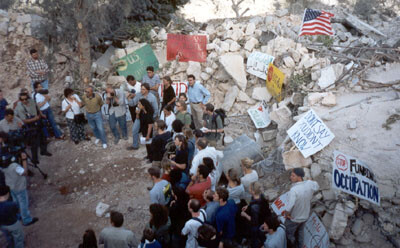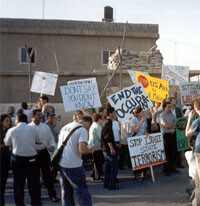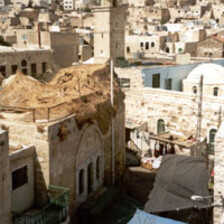Al-Manara, Ramallah’s city center was quiet. It’s Friday and most shops, except those owned by Ramallah’s Christians, were closed. From the Manara I drove up Jaffa Road in the direction of Beitunia and arrived at the Grand Park Hotel. The last time I was here was five weeks ago, at a protest organised by over a hundred internationals, working at Palestinian and international NGOs, representing over fifteen countries.

Ramallah, protest against F-16 bombardment (AEF, 2001)
The protest was organised a few days after an Israeli F-16 bombed a building belonging to Force 17 in front of the hotel, killing 24-year-old Ismail Abu Rafee’a from Gaza. The building is completely demolished. That same day, Israeli warplanes bombed Gaza, Nablus and Tulkarem. Eight Palestinian policemen were killed in Nablus when the police headquarters was razed by Israeli F-16 jets. In Gaza, the Palestinian Authority’s naval intelligence headquarters and other security buildings were attacked by jets and shelled from the sea. This was the first use of fighter planes in the occupied territories since the area was occupied by Israel in 1967.

Ramallah (AEF, 2001)
Today, the windows of the Grand Park Hotel are still damaged and doors are being repaired. The remaining rubble from the destroyed building in front of the Grand Park is being removed. Only the windows are mute reminders of the attack.
Dutch arms purchase from Israel
As Annet and I sat at a table, drinking coffee, I got a call from Jurgen, a friend in Holland. “They made an agreement”, he said. It took some time to understand from him that the Dutch government had decided to spend around 600 million guilders (US$232.8 million) to purchase an anti-tank missile system from Rafael, an Israeli state-run weapons manufacturer. The Dutch Defence Ministry has put its proposals to the cabinet but most Dutch MPs from the Social Democratic Party and the Liberal Party do not object. Some of the Dutch MPs even compared it to importing “flowers from Israel”.
The previous day, I was searching for information about this antitank missile and found a Jerusalem Post article from 2 November 2000, which reported:
“The Israeli-developed Gil anti-tank missile fired at a house in Beit Jala yesterday marked the first public operational use of the advanced rocket”.
The missile was fired from the nearby Jewish settlement of Gilo and exploded inside a four-story residential home in the Palestinian town of Beit Jala. Israel’s “first public operational use” of this missile was against Palestinians.
The standard European reaction
Despite events like these, the European Union only seems to be able to demand that the Palestinian Authority, or Yasser Arafat in particular, “end the violence.” From the Israelis, the Europeans plead for “restraint”. The whole concept of international justice and universal human rights has become blurred.
Last April, the European Union extended its sanctions against Burma for a further six months, describing the human rights situation there as ‘extremely serious’. A month later, the European Union considered whether to impose economic sanctions on Zimbabwe in the light of the government’s human rights record and the deterioration in the rule of law. The same rules clearly do not apply to Israel, which only yesterday, destroyed 20 Palestinian homes in Rafah in Gaza. How could anyone watch this taking place and not react as he or she does to similar situations in other parts of the world? But it happens.
In 1961, Dr. Verwoerd, former Prime Minister of Apartheid South Africa, made the unflattering observation that the Zionists
“…took Israel from the Arabs after the Arabs had lived there for a thousand years. In that I agree with them, Israel, like South Africa, is an apartheid state,” (Rand Daily Mail, 23 November 1961).
Five weeks in occupied Palestine keep reinforcing a single basic truth — Israel’s military occupation is a complete system of control that permeates every aspect of Palestinian life. To refrain from addressing the root causes of the current violence — this occupation — is to obfuscate the reality on the ground.
Ending the occupation and demanding an end to Israel’s gross human rights violations that are an unavoidable byproduct of military regimes will also end the current humanitarian crisis, defuse the situation and thereby prevent any escalation of violence. The governments of Europe need to wake up and recognise that nothing else will make a difference.





